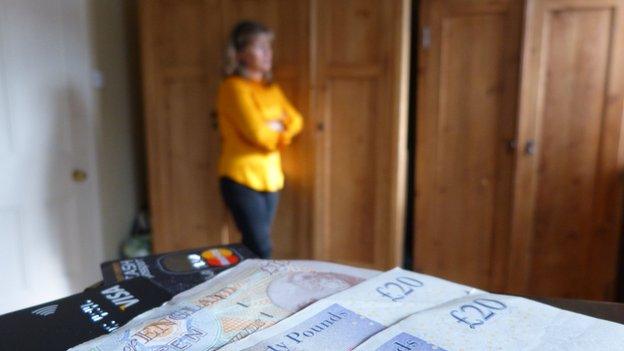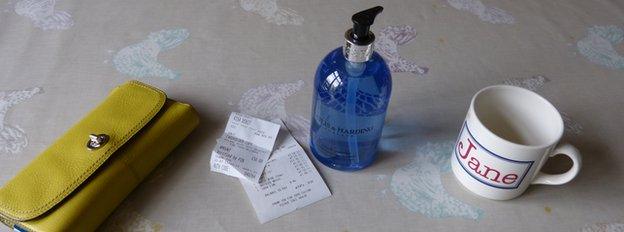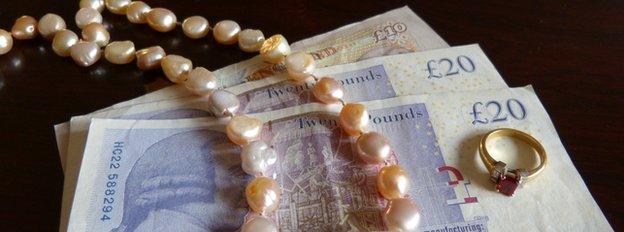Financial Abuse: How to tell if your partner is a money bully
- Published

It can start innocently enough: Perhaps your partner asks to see a receipt for the supermarket shop, or explains that he or she opened your bank statement by mistake.
But such habits can build into controlling behaviours, which leave you in fear every time you open your wallet.
Financial abuse, as it is called, can involve your partner spending your jointly-earned money, taking out loans in your name, making you pay the utility bills, or scrutinising every penny you spend.
Worse, it can be the fore-runner of even more serious emotional, or physical, abuse.
While the vast majority of victims are women, men too can be vulnerable, particularly if they have disabilities.
New laws are on their way to try to stop coercive behaviour, including in financial matters, but no one yet knows how effective they will be.
So how bad can financial abuse get, and can you detect it at an early stage?


Case Study: Jane, 35 year-old mother from Surrey
Many people have to budget carefully, but Jane (not her real name and age) became the victim of obsessive financial control.
She says her former husband - and his mother too - would inspect the fridge to find out whether the milk had been bought in Waitrose, rather than Lidl.
"I would find myself in the shop, thinking this liquid hand soap is 70p in Sainsbury's, but I can get some for 40p in Superdrug - but Superdrug is down the road. The logical thing was to buy the one in Sainsbury's, but I knew my husband and mother-in-law would pull me up."
All financial decisions - from holidays to furniture - were taken by her husband.
"He chose my car. On one occasion, as we were driving away from my parents' house, he shouted out of the window: 'She got to choose the colour.' It was very derogatory."
When her husband began to withdraw large sums of money from their joint account to spend on motor bikes, she tried to warn the bank.
Eventually her husband used up all their savings, and was declared bankrupt. Jane inherited the debts, and over £4,000 of arrears on the mortgage.
She now lives with her five year-old daughter in her parents' house. Due to her poor credit rating, she will not be able to get a mortgage - or rent a private flat - for at least six years.

Warning Signs
A recent report for the TUC and the charity Women's Aid - called Unequal Trapped and Controlled, external - found that financial abuse was often the first sign of further emotional or domestic abuse.
The authors of that report, Marilyn Howard and Amy Skipp, say the ten most frequent signs to look out for are a partner who:
takes important financial decisions without you
uses your credit/debit card without asking
controls your access to money, through credit cards or a bank account
takes your benefit payments, or wages
refuses to contribute to household bills or children's expenses
puts bills in your name, but does not contribute to them
takes out loans in your name - but does not help with repayments
takes money from your purse/ bank account
stops you working
uses you as a free source of labour

'Another tool for abuse'
Under the Serious Crime Act - which has received royal assent, and which will be implemented later this year - coercive and controlling behaviour between partners will become illegal for the first time.
Section 76, external of the Act allows for a maximum prison sentence of five years, where someone's behaviour causes alarm or serious distress to their partner. This can include financial abuse.
As a result, the Police will be given training in how to spot instances of coercive control.
Polly Neate, the chief executive of Women's Aid, believes the law will encourage victims to come forward.
"We know of many cases where women have not come forward about controlling coercive abuse - including financial abuse - because they feel the Police won't take any action unless they've been physically assaulted.
We're hoping this new law will change that," she says.
But there is widespread concern about another development - the roll-out of Universal Credit (UC).
The benefit is paid monthly on a household basis. The TUC report warns that UC will make it easier for one partner to control the finances.
Even though the DWP has promised to make split payments where necessary, Polly Neate thinks many victims will still acquiesce.
"Universal Credit, as currently planned, is another tool for people who want to financially abuse their partner," she claims.

Helplines
Money Advice Service 0300 500 5000
National Domestic Violence Helpline 0808 2000 247


'Sexy'
For Jane - as for many couples - having a joint account was a particular difficulty. She wasn't able to stop her husband taking exactly what he wanted from it.
The banks say that generally they are not able to intervene in such disputes.
HSBC, for example, will only put restrictions on a joint account if it has advice from the Police to do so.
Royal Bank of Scotland (RBS), Lloyds and NatWest will block an account if they are formally notified that there is a marital dispute.
However the banking industry says it is open to change on the issue.
"We would be happy to consider what more might be done to help in this difficult and complex area," said a spokesperson for the British Bankers Association (BBA).
In the meantime Nationwide suggests that people may like to consider joint accounts for paying bills, but individual accounts for their salaries.
On savings accounts, it is also possible to require both parties to sign before money can be withdrawn.
Further advice comes from psychologist Corinne Sweet, the author of "Stop Fighting about Money".
Speaking on behalf of the Money Advice Service, which offers help on a financial abuse, external, she says couples should learn to talk about money freely.
"Being open about money is sexy, because it grows intimacy. It grows trust. It grows a feeling of closeness," she says.